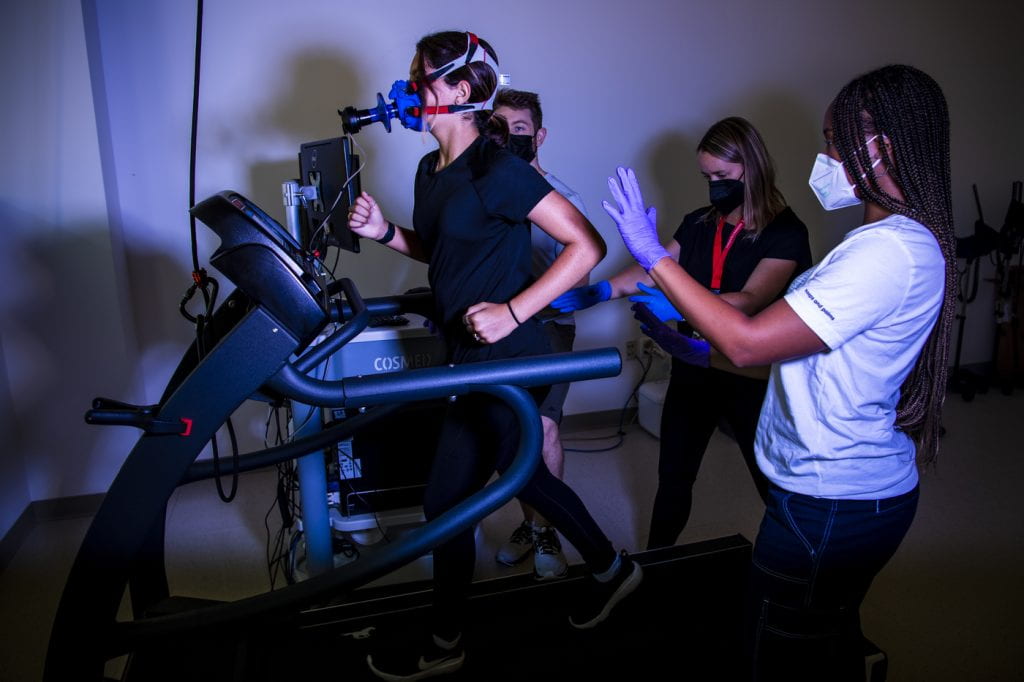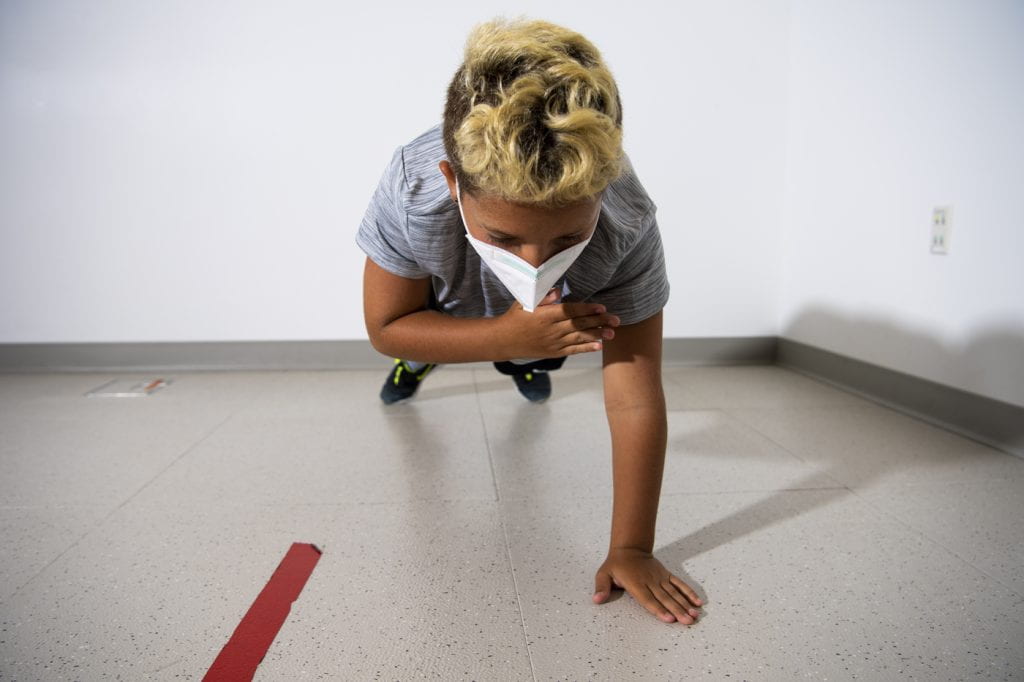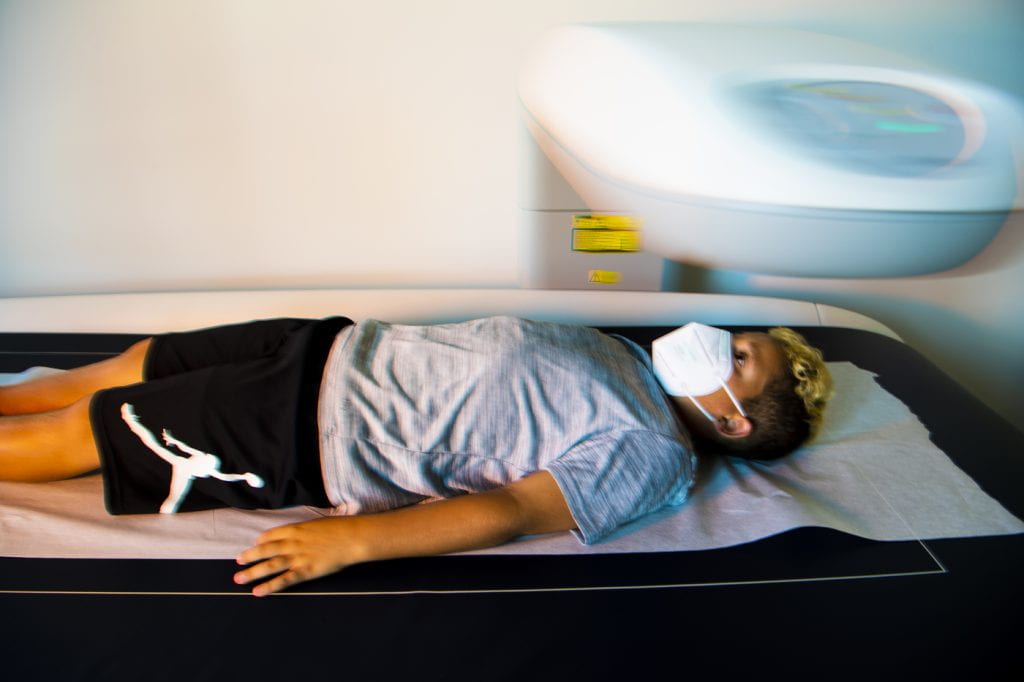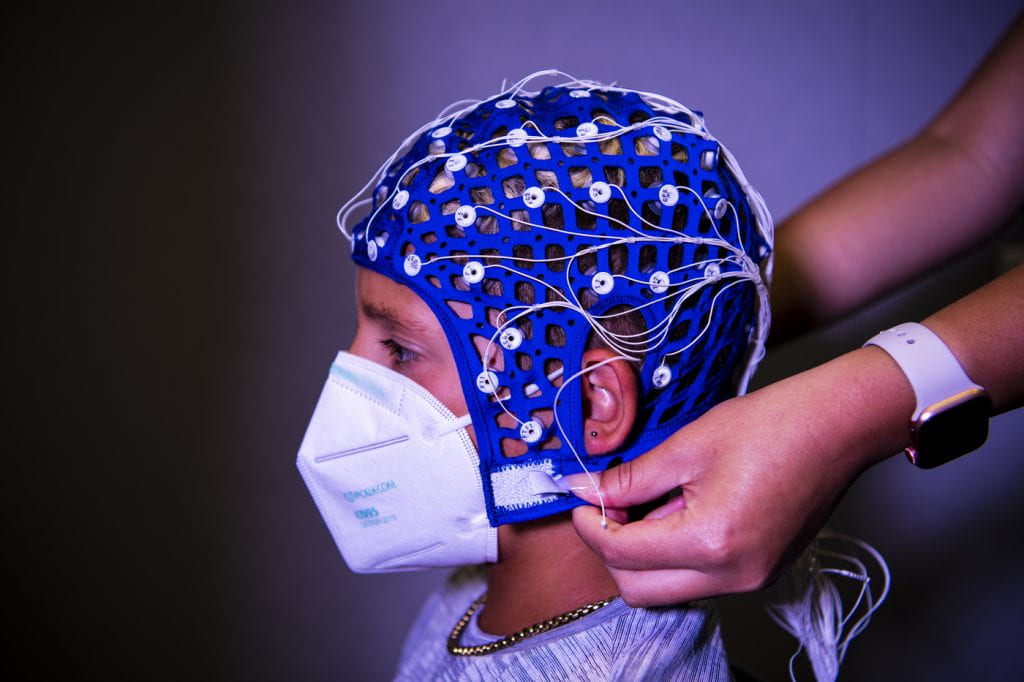Learn About Our Current Research
The research conducted in the Center for Cognitive & Brain Health employs neuroimaging, computational, and behavioral tools to investigate the relationship between health and lifestyle behaviors (e.g., physical activity, cognitive training, diet) and/or their physiological sequelae (e.g., cardiorespiratory fitness, body mass/adiposity) on cognitive and brain outcomes.
Our research investigates cognitive and brain health across the lifespan, with ongoing research in preadolescent children, young adults, and older adults. We employ tools to assess brain structure and function, including MRI/fMRI, high density EEG/ERPs, and eye-tracking measures. Further, we objectively assess physical activity and fitness using a variety of objective outcomes including VO2max and accelerometry, along with functional fitness measures. We assess body composition via dual x-ray absorptiometry (DXA) to provide several body composition outcomes including adiposity, lean mass, and bone. We have also developed a number of virtual reality platforms as a means to bring our tasks closer to what people do outside of the lab. These platforms have included: a virtual classroom in which we can explore the negative effects of distraction and the positive effects of exercise on attention, memory, and learning; the separate and joint effects of exercise and exposure to nature on different aspects of perception and cognition (using a VR headset and an omni-directional treadmill); and an exergame in which we explore the separate and joint benefits of exercise and intellectual engagement (i.e. learning a new language) on cognitive and brin health. Lastly, the Center has a comprehensive bio-specimen facility to collect and process blood, saliva, and other biomarkers to better understand the health behaviors-brain health relationship. Our overall goal is to determine lifestyle factors that influence cognitive and brain health across the lifespan, and to better understand the mechanisms and processes via which health and lifestyle behaviors improve cognition.


Physical Activity and Cardiorespiratory Fitness
Inactivity during childhood often tracks throughout life and has implications for the increased prevalence of several chronic diseases (e.g., cardiovascular disease, colon cancer, type 2 diabetes) in adulthood. Further, it is well-founded that efficiency of cognitive performance declines with advancing age leading to decrements in older adults’ quality of life. However, largely absent from public health concerns is the relationship between physical inactivity and cognitive health across the lifespan. It is of interest to determine the extent to which physical activity and fitness influence cognition during maturation and aging to enhance cognitive health and effective function throughout the entire lifespan.
Accordingly, our research on physical activity/fitness has predominantly focused on aspects of cognition that are mediated by the prefrontal cortex and hippocampus; brain regions and their associated networks, which are especially susceptible to physical activity intervention. Such aspects of cognition include executive control and relational/associative memory and learning. Prior findings from our research have indicated that preadolescent children and older adults with greater amounts of aerobic fitness (investigated either cross-sectionally or through randomized controlled interventions) have differential volume and greater integrity of brain structures (measured via MRI) underlying executive control and memory. Functional imaging measures including fMRI, EEG/ERPs, and eye-tracking findings from our lab have demonstrated differences in brain function with greater amounts of fitness or engagement in physical activity intervention. Such brain outcomes are accompanied by differences in behavioral outcomes that demonstrate advantages as a function of participation in physical activity or higher cardiorespiratory fitness. In the case of children, our work has demonstrated that such benefits extend to academic outcomes as well.
Lastly, we routinely collaborate with other researchers in the US and across the globe on exercise and physical activity studies. For example, we are part of a large NIH funded multi-site trial that is examining a year-long exercise program on the cognitive and brain health of older adults, which includes sophisticated behavioral paradigms, MRI/fMRI, PET, and analysis of blood. This study, called IGNITE, is continuing in a second phase (for another 5 years) examining long-term benefits of exercise programs for older adults. We are also actively collaborating with colleagues in Spain, China, Japan, Australia, and Canada on a variety of studies on exercise effects with children and older adults at risk for neurodegenerative diseases on cognitive, emotional, and brain health.

Body Mass/Adiposity
Obesity, and its associated comorbidities, is an increasing concern in child and adult populations throughout the industrialized world. Obesity is associated with various health complications including, but not limited to, musculoskeletal, endocrine, and cardiovascular, with a significant number of individuals presenting with hypertension and at least one risk factor for cardiovascular disease. Findings from our Center indicate that these consequences extend to brain health, such that children who are obese have poorer cognition than their normal weight peers, including deficits in attention, executive function, and academic achievement, with such findings observed across measures of brain and behavioral outcomes. Beyond obesity, our research has considered types of fat, as different fat compartments carry different metabolic risks. To that end, differential associations of visceral adipose tissue (VAT) and subcutaneous adipose tissue (SAAT) have been observed on cognitive outcomes. Not only is VAT a dangerous type of adipose tissue, and a strong predictor of adverse health outcomes, it is also related to poorer cognition in children. However, following a PA intervention, recent work from our lab also suggests that decreases in VAT, particularly for children who are obese, is related to improved cognitive abilities. Finally, work from our Center has investigated the relation of markers of metabolic syndrome on child and adolescent cognition.


Cognitive Training
Our center has pursued a number of different approaches to examining and designing cognitive training protocols in an effort to enhance selective aspects of cognition and brain function. For example, we have selected casual video games that focus on different aspects of cognition (as validated through structural equation modeling and task analyses) and examined their utility in improving aspects of cognition such as multi-tasking, reasoning and problem solving, memory, and attention. We have also designed training protocols to emphasize flexibility of processing in single and multiple-task contexts. We have found that these theoretically-based protocols can both improve the ability to multi-task for young adults (in both the trained and untrained transfer tasks) and reduce age-related deficits in multi-tasking. We have also designed computer-based video games to capitalize on tasks and paradigms that have shown some promise in enhancing training and transfer effects in attention, reasoning and problem solving, and aspects of memory in an effort to enhance cognition and brain function. In one such project, we designed a game called Mind Frontiers, which showed beneficial transfer effects to untrained measures of processing speed, working memory, and reasoning and problem solving. Finally, we have also examined the potential synergistic effects of exercise, cognitive training, mindfulness training, and direct current brain stimulation, and have found beneficial effects of multi-modal interventions for cognition and brain. Clearly, there is still much to be learned relative to the individual differences and environmental factors that influence both training benefits and transfer to untrained tasks and skills. However, we believe that we (and others) have obtained promising preliminary data, which can begin to explicate the mechanisms of cognitive training and transfer.
Current Studies
SNEACY
This experiment investigates how the mechanisms of physical activity may influence the brain. Specifically, we are interested in how a brief session of physical activity may influence cognition in children, which we will measure by assessing performance on cognitive tasks, electroencephalography (EEG), and salivary sampling.
BOOST
Moderate-to-vigorous intensity physical activity is hard to achieve yet, during midlife it slows cognitive aging. Effectiveness and sustainability of intervention programs designed for the heart and brain need further investigation, especially with regard to the self-regulatory abilities and the negative feelings evoked by exercise. This study explores the efficacy of cognitive training strategies designed to improve self-regulatory capacities for middle-aged adults between the ages of 40 and 65 to adopt and sustain a physically active lifestyle.
FLAME
Investigating Gains in Neurocognition in an Intervention Trial of Exercise (IGNITE), was a multi-site, supervised, randomized controlled trial investigating the effects of aerobic physical activity and other measures on memory and brain health (i.e., the ability to maintain attention and remember things) in older adults. This five-year follow-up aims to investigate the long-term physical activity behaviors, and memory and brain health among the same individuals who participated in IGNITE.
REVIVE
Physical activity has been a well-documented benefit to cognitive and brain health, especially chronic physical activity. There is less known about the effects of acute physical activity as a treatment for stress. This study seeks to examine the efficacy of acute aerobic exercise as an intervention to improve clinically relevant mood in young adults aged 18 – 30 years.